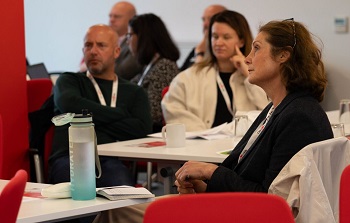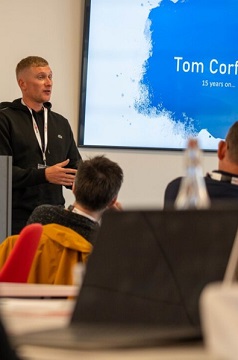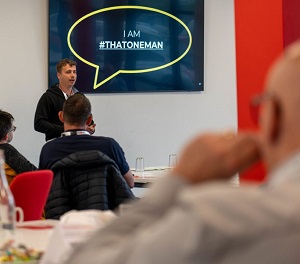Why it’s time to address the health and wellbeing crisis facing the construction sector
How training providers and employers can create a construction industry that is safer and healthier for everyone.
13 June 2024
This article includes discussion of accidents and injuries, mental health issues and suicide.
The construction industry being considered dangerous is unlikely to be news to anyone familiar with the sector, but are we doing enough to support the safety and wellbeing of those working in construction?

At the 2024 City & Guilds
Construction Conference, alongside discussion of curriculum planning, qualification funding and supporting ESOL learners, we heard from speakers who addressed the
welfare and wellbeing issues facing today’s construction workers.
While there are many health and safety rules and regulations in place across the industry and a growing awareness of the importance of mental health and wellness throughout society, there is still a long way to go to making sure that workers are as safe and supported as possible in the workplace. From ensuring that individuals and organisations understand and uphold health and safety practices to making sure learners and employees have access to resources and groups to help maintain good mental health, training providers, colleges and employers have a key role to play in building a better construction industry for everyone.
Why is this issue impacting the industry?
In a male-dominated sector with many individuals in temporary roles and work that is physically demanding and often puts workers at risk of injury, promoting good mental health and wellbeing should be a priority for everyone. According to the Office for National Statistics, 75% of people in the UK who take their own lives are male, and men in the construction and built environment sectors are 3.5 times more likely to die by suicide than the national male average.
Anita Malster MSc of Blossom Mental Health Training an organisation dedicated to providing mental health training and strategies in the workplace and in education, describes some of the factors she has seen impacting construction workers’ wellbeing: “I think that there are definitely some very structural things which are not conducive to healthy workplaces around working hours, finance, the temporary nature of work a lot of the time. Banter, I’d never want to see banter disappear from a building site because it’s what builds connection, but sometimes banter can lead to bullying and if you are not in a good headspace to begin with it can have quite a significant impact on your psychological wellbeing.”
Malster also referenced problems with alcohol and substance abuse and a lack of sufficient concern around physical as well as mental wellbeing of employees working on site as significant challenges for individuals working in construction. “I don’t think we create mentally healthy workplaces actually within this industry.”
How can providers prepare learners for the challenges of working in the construction industry?
Training providers and colleges, especially if they are working with young learners or those entering the industry for the first time, are aiming to ensure their students are ready to enter the workplace. As well as teaching key technical skills and knowledge, providers also have an opportunity and a responsibility to prepare learners for challenges and issues they are likely to face onsite.
In the case of physical health and safety regulations this is now a central component of the programmes and qualifications on offer in the sector and the main priority for providers is ensuring that their learners are confident and ready to work safely as well as effectively.

Tom Corfield of
P2BS (Proud 2 Be Safe), who deliver motivational speeches focusing on health, safety and wellbeing, spoke at the conference about his experience of being injured on site and his thoughts on advocating for himself and taking health and safety seriously.
Corfield highlighted a number of things that he feels are important for learners to be aware of when preparing for a career in construction, and it was clear he feels particularly strongly about
providers helping learners to develop the self-confidence to challenge unsafe behaviours. “
Speak up. One of the main things I always say now is open up and speak up about it. My accident wouldn’t have happened if I spoke up and said no, that’s not right, that’s not safe.”
What can employers do to better support their employees’ health and wellbeing?
While increased knowledge around health, safety and wellbeing for employees is crucial, it is also vital for employers to take responsibility for the working environment they provide. Corfield referenced feeling under pressure on the day of his accident and how this pushed him into making unsafe decisions. Avoiding this sense of pressure by creating a supportive atmosphere where wellbeing and safety are a priority can help to reduce accidents and injuries on site and minimise the stress that workers feel day to day.
This includes ensuring employees feel that they can voice their concerns or opinions, always following and emphasising health and safety regulations and making everyone aware of the support and resources available to them.
Anita Molster, founder of Blossom Mental Health Training, explained during the conference that for men struggling with mental health issues, peer-to-peer communication and activities are often more helpful than traditional methods including talk therapy.

One example of an organisation that enables this peer-to-peer support in the UK is
Andy’s Man Club who were represented at the conference by member and facilitator Jake Sharratt. Started in 2016, Andy’s Man Club is a men’s suicide prevention charity that offers free support groups both in person and online which are now attended by more than 4,500 people. By providing an opportunity for men to talk about the problems they’re facing and their mental health with other men in similar situations, Andy’s Man Club can make a real difference in people’s lives.
Creating a safer and healthier construction industry
Ensuring that staff in teaching or leadership positions have the knowledge and capability to identify challenges and direct individuals to the right resources or support could make a big difference in promoting improved mental health and wellbeing.
City & Guilds are proud to work in the construction sector and committed to making it a safer and more welcoming environment. With the support of organisations like Andy’s Man Club, Blossom Mental Health Training and P2BS and commitment and collaboration from employers and training providers, we can all help to create a better construction industry for everyone.
Arrange mental health training for your workplace or training provider with Blossom Mental Health Training here
Find your nearest Andy’s Man Club or learn more about their work here
Learn about the work P2BS are doing to make construction a safer place here